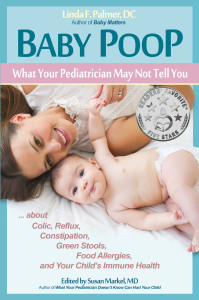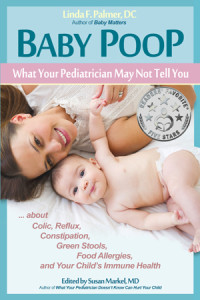The below table, excerpted from “BABY POOP,” shows 24 different options for treating constipation in babies, along with comments on each one. What treatment is right for your baby? From the author of “BABY MATTERS,” check out “BABY POOP” for lots more helpful information. The studies show that natural methods are best.
Table 3. Constipation treatment options for babies and children
|
Agent |
Action |
Advantages |
Disadvantages |
|
Switch of formula or mother’s diet |
· Prevents constipation by eliminating allergens |
· Prevention, not just treating symptoms |
· Takes time and some sleuthing to find the right diet |
|
Lower-iron formula for formula-fed |
· Reduces constipation from iron |
· If it works, elimination of cause |
· Concerns over anemia but not well-founded |
|
Physical measures |
· Help move stool through |
· No chemical or sugar ingestion |
· None, generally harmless |
|
Glycerin suppositories |
· Attract water into rectum · Ease passage of stool |
· Quick results · Appropriate for young infants |
· Concerns over dependency with frequent use |
|
Saline (phosphate) enema (Fleet) |
· Adds and attracts water into lower colon · Stimulates movement |
· Quick results |
· Risk of phosphate overdose · Muscles can weaken with long-term daily enema use |
|
Homemade salt enema |
· Adds and attracts water into lower colon · Stimulates colon by expansion |
· Quick results · Considered quite safe when properly used |
· Muscles can weaken with long-term daily enema use |
|
Milk and molasses enema |
· Attracts water · Causes gas formation to push stool out |
· Quick results · Highly effective · Natural ingredients |
· Can be quite uncomfortable |
|
Senna (Senokot) enema |
· Stimulates intestinal movements |
· Quick results |
· Generally not recommended under age 2 |
|
Senna products oral |
· Stimulates intestinal movements |
· Natural herb |
· Often need attendant softener |
|
Bisacodyl (Dulcolax) oral, suppository, or enema |
· Stimulates intestinal movements |
· Commonly prescribed |
· May cause nutritional or fluid imbalances with long-term use |
|
Docusate (Colace) oral |
· Softens stool |
· Commonly prescribed |
· Effectiveness not well-established |
|
Prunes, pears |
· Add fiber and special water-attracting sugars |
· Natural · Regular usage is fine |
· Not before solid food age |
|
Prune or pear juice |
· Adds fluid and special water-attracting sugars |
· Easy acceptance |
· Not before solid food age · Cause insulin surges · Cause tooth decay |
|
Fiber powders and supplements |
· Add bulk · Maintain water in intestines |
· Food for healthy flora · Long-term use fine |
· Slow to act · Difficult acceptance |
|
High fruit and vegetable consumption |
· Adds fiber and special normalizing sugars (both also found in breastmilk) |
· Promotion of gut and general health · Natural prevention |
· Only toddlers and older can eat enough · Not strong enough for urgent impaction |
|
Probiotic foods and supplements |
· Provide healthy flora |
· Flora support · Promotion of gut and general health |
· Mild and slow effect · Require additional mode of treatment |
|
Magnesium products (Natural Calm, Milk of Magnesia) oral |
· Attract water into intestines |
· Gentle · Simple · Valuable nutrient |
· Slight risk of overdose |
|
Mineral oiloral or enema |
· Lubricates |
· Time-proven remedy |
· Reduce some vitamin absorption |
|
Castor oil oral |
· Lubricates · Stimulates movement |
· Time-proven remedy |
· Can cause strong sensations |
|
Palm, cod liver, or flax seed oil oral |
· Lubricates · Is anti-inflammatory |
· Nutritious · Small doses okay under 6 months |
· Difficult administration |
|
Simple sugars, corn syrup |
· Draw water into intestines |
· Easily accepted · Okay under 6 months |
· Empty calories · Cause insulin surges · Cause tooth decay |
|
Lactulose sugar |
· Holds water in intestines · Causes gas formation to push stool |
· Not absorbed as sugar · Not cause insulin surges · Feed healthy flora · Easily accepted |
· Prescription only, despite excellent safety record |
|
Sorbitol sugar |
· Holds water in intestines · Causes gas formation to push stool |
· Not cause insulin surges · Feed healthy flora · Fight tooth decay · Easily accepted |
· Adds sugar calories |
|
Polyethylene glycol (PEG) oral (Miralax) |
· Maintains water in the stool |
· Frequently chosen by pediatricians |
· Damages healthy flora · Increasing serious concerns over safety |
Palmer, L. F. Baby Poop. 2015 



tq for your information
hi! just wondering what is the best formula to prevent constipation over the kids? cz my little one is having constipation problem also. since last week he hasn’t poo. im so worry bout him! brought him to see doctor but still the same. haih 🙁
I give several suggestions in my book, based on the various possible causes. It could be that he just needs a lower iron formula. More likely, he’d do better with a highly hydrolyzed formula or maybe a switch to soy, as cow milk proteins are the most common cause of constipation.
hmmm..maybe u can check the above solution lo.. i think u can create a toilet routine for the kids, so that they will go toilet every day themselves la.. or give them eat fruit that got high fibre la, like banana, papaya, orange…
I guess I should add an excerpt from the book, as fiber sources are certainly well discussed and some things in this chart are mostly advised against.
thanks!!!!!
My baby is 2 month old and for the pass 5 days no poo,am so worried don’t know what to do pls….
Thanks
There are lots of questions to ask; it’s not simple. I don’t just tell everyone to buy my “Baby Poop” book, but it may be your best option as I cover this topic very thoroughly. The quick, possible answers are, first, it’s very common for an exclusively breastfed baby to go a week or even 10+ days without pooping, and they do just fine. You can do a little dietary investigation to see if baby is reacting to anything in mom’s diet. Cow’s milk is the most common offender. Another possibility is that baby just started formula supplements?? Formula can be very constipating and the first transition to anything with free iron (mom’s milk protect the iron from feeding more-challenging bacteria) can be especially constipating. If formula is being used, a switch to low-iron formula may help or baby may need a non-dairy formula. Babies can also react to dairy (milk products) in mother’s milk (in breastfeeding mother’s diet), resulting in constipation, but usually, in this case, we would see colic or rashes along with the infrequent stooling. If baby has regularly had a few poops a day, and now is suddenly not pooping, it’s either a dietary reaction or a greater concern that needs to be discovered.